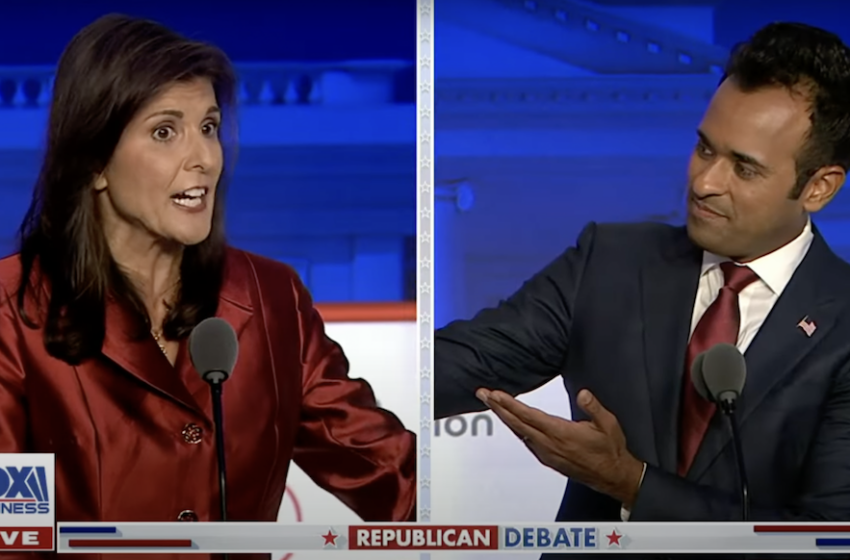Nikki Haley and Vivek Ramaswamy: Pride and shame? The Indian American diaspora’s dilemma

It’s hard to believe that the second-and third-generation Indian Americans (those born here) would subscribe to the views of Vivek and Nikki.
By Shekar Narasimhan
When asked how I feel about Nikki Haley and Vivek Ramaswamy running for the Republican nomination for President of the United States, my initial reaction is to express my pride that “we have arrived.”
The “we” is, as a leader in the Asian American, Native Hawaiian and Pacific Islanders (AANHPI) community and as a first-generation Indian American immigrant.
READ: Vivek Ramaswamy, Nikki Haley forge ahead of Ron DeSantis(September 21, 2023)
Then, my second reaction is to recognize that I could not support either of them, notwithstanding the filial bonds, as their values are so different. To be more discerning, there is a distinction between the two: Haley, a former governor of South Carolina, possesses credibility and is less bombastic. But she reminds me too much of former Louisiana Gov. Bobby Jindal — flair, ambition and promises, but little relationship to the community and lacking the integrity I expect of candidates.
It is not the first time that AANHPI candidates have appeared on a presidential debate stage. In 2020, there were three: Rep. Tulsi Gabbard participated in one debate, Sen. Kamala Harris in two, and Andrew Yang lasted for a few more.
Gabbard touted her Hawaiian heritage and Hindu connections, while Harris did not prominently display her Indian American identity (and, to put it in context, India was not yet considered a “rising power”). As for Yang, while his heritage was evident, he used it to his advantage and ran as an outsider with innovative ideas.
Narasimhan: Trump indictment was inevitable but still sad for America (April 3, 2023)
However, Vivek Ramaswamy falls into a different category — best described as a mini-Trump and a political entrepreneur, akin to Yang. Yet, he is so inconsistent and contradictory that it could be seen as political malpractice, even in the Trumpian era!”
Here are a few simple data points:
Ramaswamy now wants to abolish birthright citizenship. It’s interesting considering both of his parents were green card holders when he was born. They were legal residents but not citizens. Try explaining that nuance to a judge.
Ramaswamy says he believes in meritocracy and opposes affirmative action. This position is somewhat inconsistent with what I believe has happened in his own life. For instance, I am sure he or someone associated with him has utilized minority set-aside programs like 8(a), and I am also certain that, if asked, his parents would admit to facing overt or subtle discrimination in and out of the workplace.
Ramaswamy says he wants to abolish the H-1B visa program, which is designed for high-skilled immigration. I would be willing to bet that some of his companies have benefited from this program and used it in the past.
Somewhat like Jared Kushner’s fund business benefitted from his role in the White House, Ramaswamy’s own investment fund called STRIDE, which claims to be an anti-ESG Fund, has doubled in size to $1 billion since he started running for president. Whether this is just luck, timing, or his visibility, it certainly seems like the economic ROE for his investment in running is pretty good!
READ: Shekar Narasimhan: Biden is sane, sensible and understands India; he’s better for New Delhi (October 8, 2020)
Similar to how Jared Kushner’s fund business benefited from his role in the White House, Ramaswamy’s own investment fund, named STRIDE, which claims to be an anti-ESG Fund, has doubled in size to $1 billion since he started running for president. Whether this is due to luck, timing, or his increased visibility, it certainly appears that the return on investment for running for president is pretty good!”
Credit where it is due: Ramaswamy has not changed his name or religion to suit his new occupation. Hopefully, he and Haley won’t end up somewhat unrecognizable after the experience, as was the case with Gabbard and Yang.
There’s a wide generational gap between those born and raised here in the United States and those who have more recently arrived (one data point being that 70 percent of the 4.4 million Indians in America have come since the year 2000). For those who came before 2000, it was a different India we left, and we’ll never fully catch up or completely understand it. In fact, being nostalgic, reading WhatsApp propaganda, or getting caught up in the nativism of Indian politics may seem easier.
It’s hard to believe that the second-and third-generation Indian Americans (those born here) would subscribe to the views of Vivek and Nikki. Even though I don’t fit into that box, I certainly don’t either.
Frankly, I am ashamed of their hypocrisy and gall.
Yes, I do feel both, Pride and Shame!
(Shekar Narasimhan is the Chair and Founder of AAPI Victory Fund, www.aapivictoryfund.com)
